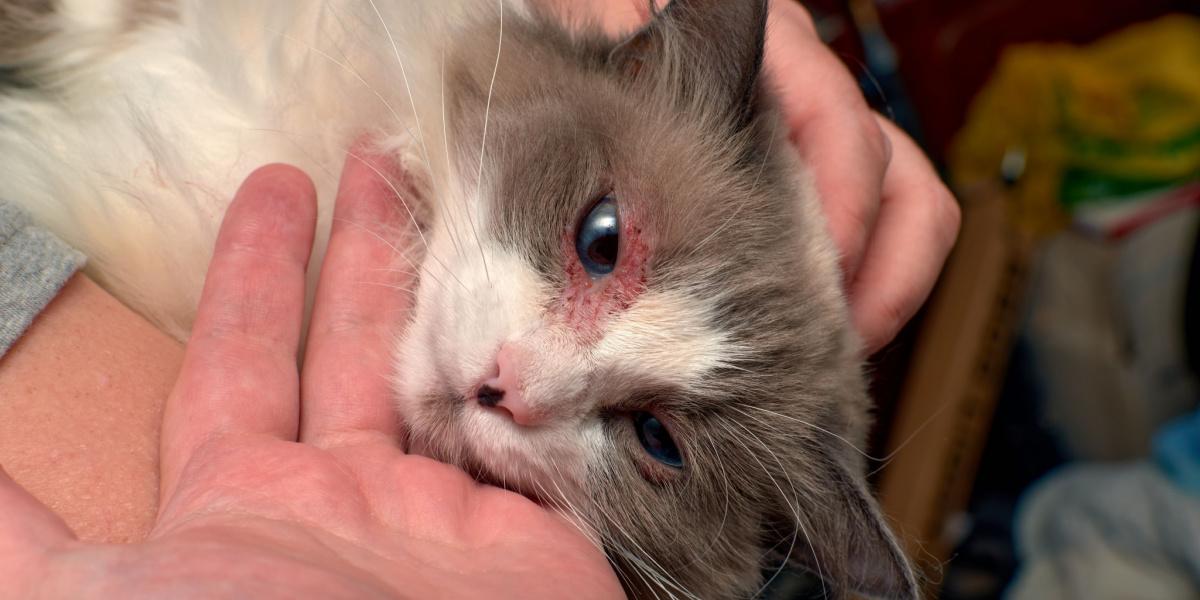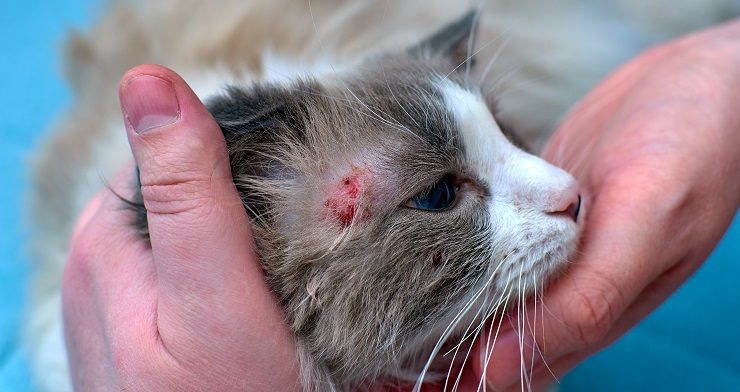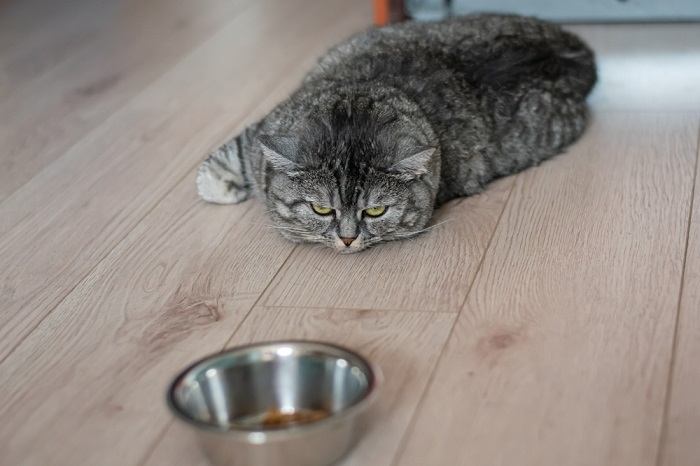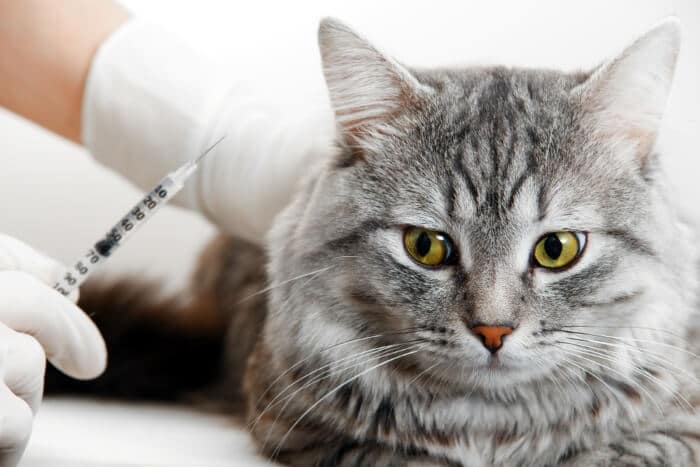
Depo-Medrol for cats is a long-acting steroid injection. It is used for inflammatory, immune-mediated, or allergy-type conditions. In this article, you’ll learn what Depo-Medrol is, when it may be used, the side effects to monitor for, and some frequently asked questions.
Quick Overview: Depo-Medrol for Cats

About Depo-Medrol for Cats

Depo-medrol for cats is injected rather than given orally, making it long-lasting and easier to administer.
Depo-Medrol is a brand name for the injectable steroid drug methylprednisolone acetate. It is manufactured by Zoetis Animal Health.
There are a couple of different kinds of steroids. Steroid hormones, like progesterone and testosterone, act as signal messengers in the body. Anabolic steroids, such as those used by professional bodybuilders, are those that act to increase muscle and bone growth.
Corticosteroids are a third class of steroids. Corticosteroids are involved in a variety of mechanisms within the body, including stress response, immune response, regulation of inflammation, and others.
When we use corticosteroids, it is typically for anti-inflammatory activity to help reduce swelling and inflammation in the body. At higher doses, it suppresses the immune system, which can be a good or bad thing, depending on the disease being treated.
While similar to other glucocorticoid steroids like prednisone or hydrocortisone, methylprednisolone is far more potent. It is 4-5 times more potent than hydrocortisone.
Methylprednisolone comes in oral tablets and a couple of injectable forms, but the brand Depo-Medrol only refers to a long-acting injectable form of the drug.
What Does Depo-Medrol Do for Cats?

Depo-Medrol is ideal for cats that don’t respond well to taking medication orally.
Depo-Medrol is used in the same types of situations where an oral steroid like prednisolone may be used.
This most often includes inflammatory conditions, immune-mediated conditions where the immune system is overreacting to a stimulus and causing harm to the body, and in the case of allergic conditions.
Specifically, this may include inflammation secondary to a wound or infection, an immune-mediated condition such as those that cause blood disorders like low red blood cells or platelets. It also includes inflammatory allergy conditions like atopic dermatitis, inflammatory bowel disease (IBD), or feline asthma. It is also used for certain types of cancer that respond to corticosteroid therapy, such as lymphoma.
In a majority of cases, the preference for the type of steroid will be oral. Oral prednisolone in cats can be dosed very closely. Doses can be adjusted in the case of unwanted side effects or when the dose may need to be increased to be effective.
Cats are fairly infamous for rejecting oral medication. They often spit them out or drool excessively afterward. Because cats don’t like being given medicine orally, cat owners risk getting bitten or scratched when attempting to do this at home.
It is mostly in these situations that veterinarians reach for Depo-Medrol. Depo-Medrol for cats is injected, and a dose lasts for weeks or months.
However, while this may seem very convenient, methylprednisolone acetate’s potency and long duration of effect also carry the risk of more significant side effects. Because of this, it is often a last choice for many vets when looking to treat a cat with steroids
Side Effects of Depo-Medrol for Cats

Side effects of Depo-Medrol can occur in cats, but they are often milder than they are in dogs.
Generally speaking, when compared to dogs, cats require higher doses of a steroid to accomplish the same effects. Still, noticeable side effects are much less apparent in cats.
The exception is when steroids are used for a longer period of time. Because Depo-Medrol is always a more potent and longer-acting medication compared to prednisolone, side effects are more noticeable, more concerning, and require more careful monitoring.
The side effects of any steroid include increased thirst, urination, and appetite. There are also digestive upset signs, with diarrhea being the most common in cats with the potential for vomiting or decreased appetite. While more commonly seen in dogs, ulcers of the stomach and upper digestive tract can also be a potential risk.
These are less appreciated in cats, especially in the short term. If these side effects show up, they generally resolve when the steroid is discontinued with some additional supportive care sometimes needed.
However, with a Depo-Medrol injection, the slow absorption can lead to effects that may last for weeks to months and can be different for each cat. So even with just a single Depo-Medrol injection, we have to consider the long-term use effects of steroids to look out for.
Other Risks and Considerations

Depo-Medrol is not appropriate for all cats. A veterinarian will help you decide if it is right for your cat.
A potent long-acting steroid must be used cautiously with any active bacterial or viral infections, especially severe infections. Oral steroids are often given alongside antibiotics for certain types of infections. With Depo-Medrol being more potent and its full duration in a feline patient not fully predictable, this could affect the immune system’s ability to fight infection.
The biggest risks for cats using Depo-Medrol are the development of diabetes mellitus and congestive heart failure.
The use of corticosteroids in the body can lead to a degree of resistance to insulin, the hormone that is needed to transport blood sugar from the bloodstream and into cells. This rarely has consequences over the short term, but long term, this resistance can lead to the full development of diabetes.
Cats who are overweight or obese and already at a higher risk of developing diabetes, are at the highest risk of crossing this threshold if a Depo-Medrol injection is used. Long-acting steroid use can also lead to weight gain.
Long-acting steroid use can lead a cat with heart disease to heart failure. This happens when fluid begins to build up in or around the lungs and sometimes also around the heart itself, as well as the abdomen.
These two significant risks of Depo-Medrol use have led many veterinarians to screen cats for risk prior to starting Depo-Medrol as a primary treatment choice. This includes checking blood sugar and the heart itself for abnormalities. This is done using a blood test, x-rays, or an ultrasound of the heart.
Depo-Medrol use should be avoided in pregnant cats and used cautiously for lactating animals.
Interactions With Other Medications and Overdoses

Steroids commonly interact with other drugs and need to be used carefully.
There are many medications that interact with steroid use, especially long-acting steroids. Common ones include other immunosuppressant drugs like cyclosporine, non-steroidal anti-inflammatory medications (such as meloxicam or robenacoxib), and certain diuretic drugs like furosemide.
While the use of Depo-Medrol is avoided in diabetic cats, its use will often lead to increased insulin requirements to manage the condition.
If steroids are being used for immunosuppression, vaccination should be carefully considered, This is especially true for live-attenuated viral vaccines, because the immune system may not respond properly. The vaccine(s) for panleukopenia virus, herpesvirus, calicivirus, and Chlamydia may be modified live while vaccines for rabies and feline leukemia virus (FeLV) are not.
Because Depo-Medrol is given intramuscularly with a needle and syringe, some transient pain may be present at your kitty’s injection site. Make sure to contact your vet if noticeable soreness lasts for more than 24 hours.
Overdoses with Depo-Medrol are uncommon since this medication is always administered by a licensed veterinarian in accordance with guidelines and not given at home. However, even with an acceptable dose, side effects are possible.
If you are ever concerned that your kitty may have developed side effects or toxicity after receiving Depo-Medrol, make sure to contact your veterinarian, the ASPCA Animal Poison Control Center (1-888-426-4435), or Pet Poison Helpline (1-855-764-7661) immediately for further advice.
Depo-Medrol for Cats Dosage

The dosage of Depo-Medrol varies depending on your cat’s needs.
Depo-Medrol is FDA-approved for intramuscular injection use in cats.
The usual intramuscular (IM) dose range for Depo-Medrol for cats is between 10 mg and 20 mg per cat. The dosage used will depend on the condition being treated. There are different concentrations of Depo-Medrol available, so the volume of the injection in milliliters (ml) may differ depending on what concentration your vet carries.
The goal of any steroid therapy is to use the lowest effective dose and the longest intervals between doses that still control signs of disease. It is common for Depo-Medrol injections to be given every 4-6 weeks for chronic conditions, or sooner if signs of disease return.
Final Thoughts

Long-term use of Depo-Medrol in cats carries certain risks, which need to be monitored closely.
Depo-Medrol for cats is a potent long-acting steroid. It is used for very similar purposes as other steroids like prednisolone, but because of its potency and duration and risk for long-term side effects, is often restricted to use in cases where a cat cannot be administered an oral medication practically or safely. Any cat parent whose kitty is receiving a Depo-Medrol injection should be aware of the possible risks and alternatives to its use, if any.
Also Read: 10 Subtle Signs Your Cat May Be Sick
Frequently Asked Questions
What does Depo-Medrol do for cats?
Depo-Medrol is a long-acting steroid injection. It is used more often in cases where an oral steroid is not safe or practical to administer to a cat, especially where steroid therapy is needed for a longer period of time.
Depo-Medrol for cats is used in cases of inflammation, and immune-mediated disease to suppress the immune system from harming the body, allergic diseases like atopic dermatitis or feline asthma, and in cases of some cancers, such as lymphoma.
How long does a Depo-Medrol shot last in cats?
The onset of relief, anti-inflammatory effect, or immune-suppressing duration of any Depo-Medrol injection will vary from cat to cat. It is labeled as an injection for intramuscular administration and its slow absorption can lead to a duration of weeks to even a couple of months in some patients.
To know how long a Depo-Medrol shot may last, signs of disease return must be monitored for. Common intervals for Depo-Medrol injections may be every 4-6 weeks for chronic conditions, or sooner if signs of disease return more quickly.
What are the side effects of a steroid shot in a cat?
Cats often do not show much in the way of short-term side effects from steroid use. However, with long-acting injections like Depo-Medrol, side effects can be more apparent and sometimes more serious.
Excessive thirst, urination, appetite, and weight gain are all possible, as well as digestive upset effects like diarrhea, vomiting, and a decrease in appetite.
Cats at risk for diabetes mellitus, especially overweight or obese cats can be at higher risk of a long-acting potent steroid inducing diabetes.
Cats who have, or who are at risk for, an underlying heart disease condition, such as hypertrophic cardiomyopathy (HCM) can be put at higher risk of developing congestive heart failure (CHF) from steroid use.








My cat just recieved the shot 2 days ago for itching and it is not working they said it would take 24 hours to work but no change she is still itching and licking
Hi Tammy,
In general, if you’re not seeing the results you’re expecting, you need to follow up again with your vet. Response to a treatment approach (or lack thereof) can sometimes tell us a lot about the underlying cause, especially if it wasn’t clear initially. If a steroid does not help to resolve itching (as from an allergy condition), I would consider an additional underlying cause of the itching that the steroid may not be addressing. This might include fleas (you may not even see any visible fleas or flea dirt on a highly flea allergic cat), secondary bacterial skin infections can also cause bad itching. Although less common to see these days, sarcoptic mange is another super itchy skin condition that a steroid alone won’t fully relieve.
My cat has been on Depo Medrol for years initially for a rash on nose and ears and then for irritation in mouth – This has been going on for 4 to 5 years regally now. I want to try and get her off of it I’m scared her immunity to it is growing and it will lead to other problems. After 30 to 40 days She loses her appetite and I thought it was irritation in mouth but she cleans her self no problem and often. This time I’m thinking of trying to ween her off of it. Is it dangerous to wait another month and see if her appetite comes back to normal, losing some weight would be a good thing but I don’t want kill her
Hi Keith,
Thanks for sharing your concerns. I think it’s important to discuss with your vet what alternatives there are to Depo Medrol if you have concerns about continued use. I can only speculate a bit about what is going on with your cat, but for the sake of argument, let’s say we have a persistent allergy condition like atopic dermatitis or something immune-mediated like eosinophilic granuloma complex that can cause recurrent red lesions on the skin and in the mouth.
Steroids work well for these conditions but they often require recurrent or life-long therapy. There are other medication options including cyclosporine or Apoquel that can be used. If an allergy is suspected, allergy testing can be used to develop immunotherapy treatments.
An oral steroid like prednisolone is also an option and allows the lowest effective dose to be used, which can lower risk of long term side effects while also managing the condition as best as possible.
If oral medication is not an option, that is where Depo Medrol may be the most appealing. In this case if needed, you can try to see the longest interval of time that you can get in between injections or use the lowest effective dose.
If you think the lesions are controlled but appetite becomes an issue, this might be a post-steroid effect of it wearing off. You can talk to your vet about appetite stimulant options as an alternative.
Yes its the time between shots thats getting less and less although I drag it out as long as possible at present she knows its time to go to the vet for shots and she hides in yard and wont let me catch her witch is fine except she wont eat anything. I force feed her at times but its a huge fight I’m wondering how long can she go with out food, she could stand to lose weight, so far been two days but she has eaten little before that and that is me feeding her. A real pain in the you know what
It’s best not to let a cat go more than 24 hours without food as hepatic lipidosis can set in, which adds significant illness complications. It may take more days for that complication to occur, but the risk is always there after 1-2 days of anorexia. If we think the anorexia is only related to coming off the steroid and not related to the primary lesions or another condition, appetite stimulant options like mirtazapine or capromorellin may be helpful to ask your vet about if your goal is to avoid or postpone another Depo Medrol injection.
Our kitty had a rhinoscopy/biopsy and was diagnosed with a sinonasal mass: basaloid ductular carcinoma. They gave her a Depo Medrol injection after the procedure. The vet would like to start her on Piroxicam and I am wondering how long to wait before starting the NSAID since the steroid stays in the system so long. Our oncology consult isn’t until March 12th unfortunately.
Hi Cindy, I’m sorry to hear about your kitty’s diagnosis, but that is a great question. Unfortunately it does not have a definitive answer, and this is a disadvantage to using Depo Medrol. Depo Medrol may last weeks to months and can vary between cats. The safest interval before starting an NSAID may be somewhere in the 1-2 months range after the steroid injection was given. If I found myself in this position, where my patient’s in-person consult with an oncologist is still 6 weeks away, I would contact an oncologist associated with the lab that processed the tissue biopsy sample. Main labs like Antech and IDEXX will have specialists available for vets to speak to. A phone consult with one of their oncologists may help provide guidance on starting piroxicam and how to balance that best with the Depo injection.
went to see vet with my 11 yr old Cat and was given DEPO-MED INJ CC 20MG/ML FOR CAT THAT HAD SYMPTOMS OF COMMOM COLD OR I FELT COJESTION Was this the right meds to be given
Is this correct or wrong
Hi Jim,
This really depends on your veterinarian’s diagnosis and your cat’s risk of side effects. At that 20mg/ml concentration, a cat might get 0.5ml up to 1ml depending on their weight and what type of condition is being treated.
Generally, a steroid can be helpful for diseases causing inflammation of the airway. Feline asthma is common but this might include a viral upper respiratory infection too if a vet does not feel a bacterial infection is present.
Because Depo Medrol hangs around in the body for a long time (for weeks) and you can’t take back an injection if there’s side effects, we often see if oral steroid dosing is possible first. There are certainly many cats who cannot be pilled or orally medicated at home and so then Depo Medrol may be the most viable option.
It’s always important to assess a cat’s risk for heart disease or diabetes with any steroid, but especially Depo Medrol, since it lasts in the body for several weeks. If those risks are low and medicating at home may be stressful or difficult (for cat or owner), then it certainly can be of help.